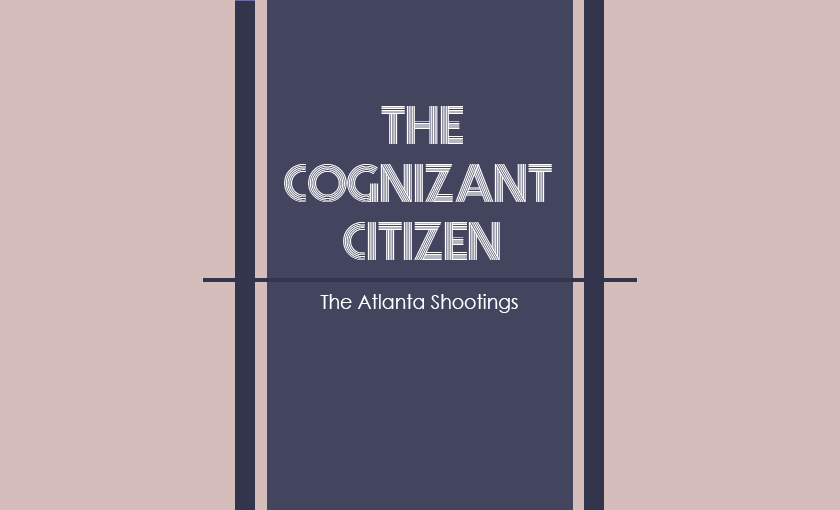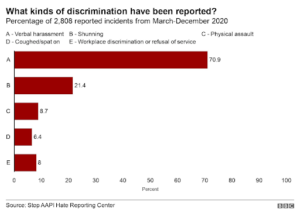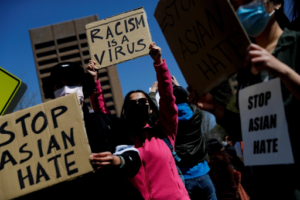
Racism Fuels Violence and Dehumanization: How A (White Man’s) “Bad Day” Had Fatal Consequences.
Atlanta Spa Shooting: What Happened?
The Asian-American community is left feeling desperate and vulnerable to increased hate crimes and violence. The fears, far from mere imaginative anxieties, spelt out during what is now called the Atlanta spa shooting, when a 21-year-old white man, Robert Aaron Long, opened fire, claiming the lives of eight innocents.
The brazen shooting has sparked outrage and unrest. This is mainly because while on a killing rampage, the suspect visited at least three spas, primarily populated by Asian-American women. This has caused speculations of racist undertones to the violence committed. The deceased are also of Asian descent, four of them being ethnic Koreans, an official from the South Korean Consulate in Atlanta confirmed.
The deceased are Delaina Ashley Yaun, 33; Paul Andre Michels, 54; Xiaojie Tan, 49; Daoyou Feng, 44; Yong Ae Yue, 63; Suncha Kim, 69; Soon Chung Park, 74; Hyun Jung Grant, 51 and Elcias R Hernandez-Ortiz, 30.
Upon further investigation, law enforcement said the suspect was recently kicked out of home and has also been reportedly treated for sexual addiction. Although the suspect denied any racial motivations, it has not been ruled out entirely. Hence, activists, police, and citizens alike do not buy his blame on the “sexual addiction” that pushed him over the edge and tempted him to commit the murders. The spa has not previously been recorded for any cases of sex work, and Atlanta mayor Keisha Lance Bottoms affirmed that the businesses were “legally operating.” She stated that they “will not begin to blame victims.”
Whatever the reasons were, the internet was outraged to learn that investigators from Cherokee County, Long’s first cite of crime, maintained that his sexual addiction might have provoked him. Ignoring that Asian-Americans largely populated the target’s locations, some investigators were heavily criticised for claiming that the perpetrator just had a “really bad day.”
What tipped the scales?
On March 17, U.S. President Donald Trump tweeted, “The United States will be powerfully supporting those industries, like Airlines and others, that are particularly affected by the Chinese Virus. We will be stronger than ever before!”
The COVID-19 pandemic, apart from fuelling worldwide lockdowns, joblessness, and despair, has resulted in a huge uptick in Asian-American violence in the States. Reportedly, violence rates exacerbated after a racist tweet made by the former President who referred to it as “the Chinese virus” and “Kung Flu.” Such wordplays and xenophobic sentiments had their eventual consequences.
A recent study by the University of California examined that 668,597 tweets and 1,273,141 hashtags circulated the words #covid19 or #chinesevirus and analysed that 19.7% of hashtags with #covid19 exhibited anti-Asian sentiment.
History of Racism against Asian-Americans: Atlanta hate crime one of many
Vicha Ratanapakdee, an elderly Thai immigrant, died after being shoved to the ground. Noel Quintana, a Filipino-American was slashed in the face with a box cutter. A Chinese woman was slapped and then set on fire. These are just some examples of the recent violent attacks on Asian-Americans. A part of the surge in abuse was the start of the pandemic a year ago.
The killings in Atlanta, Georgia, followed a year of mounting anti-Asian violence in the United States due to Asian-Americans being blamed for the coronavirus first identified in Wuhan, China, in 2019. From March to May 2020 alone, over 800 Covid-related hate incidents were reported from 34 counties in the state, according to a report released by the Asian Pacific Policy Planning Council.
In 2020, 3800 anti-Asian hate incidents, including shunning, slurs, and physical attacks, have been reported. 68% of these attacks had been directed towards women.
 Asian women have been specifically targeted for attack in some countries, adding misogyny to the toxic mix of hatred. Women have always dealt with harassment from men and public safety issues more broadly, but the pandemic provided another “excuse” to target Asian women.
Asian women have been specifically targeted for attack in some countries, adding misogyny to the toxic mix of hatred. Women have always dealt with harassment from men and public safety issues more broadly, but the pandemic provided another “excuse” to target Asian women.
Historically, black and indigenous women have navigated intersections of racist and sexist abuse. The sexualisation of Asian women in the porn industry and acts such as the 1875 Page Act, which banned Chinese women’s immigration to America on accounts of all them being ‘prostitutes,’ invoke racialised sexual concerns. The long history of wars and fetishisation of Asian women, who the government sold as prostitutes, work their way into contemporary narratives of hate.
National and International Reaction
The shootings prompted an outpouring of agony, especially from local communities. Since 19th March, mourners have piled flower bouquets and signs, lit candles, and said prayers outside the spas where the victims were killed.
During his first week in office, President Joe Biden signed an executive action essentially banning hateful language such as Trump’s within the federal government.While referencing the violence in his first national prime-time address, he also signed a memorandum earlier in 2021 that issued guidelines on how the Justice Department should respond to the heightened number of anti-Asian bias incidents.
Lawmakers are pushing for the US Department of Justice to expand efforts to report, track and prosecute hate crimes. At the state level, California lawmakers allocated $1.4m (£1m) in state funds to expand data collection, advocacy initiatives, and resources for victims. Crowds of people wearing masks, waving American flags, and carrying posters that read “We are not the virus” and “Stop Asian Hate” stood in front of the golden-domed Georgia State Capitol building on March 20th.
Crowds of people wearing masks, waving American flags, and carrying posters that read “We are not the virus” and “Stop Asian Hate” stood in front of the golden-domed Georgia State Capitol building on March 20th.
Several celebrities, including Lana Condor, Eric Nam, and Gemma Chan, spoke up about the issue, lending their voices to this movement and using the hashtag #StopAsianHate. Grey’s Anatomy star Sandra Oh made an appearance at the ‘Stop Asian Hate’ rally in Pittsburgh on March 20th and gave a riveting speech.
The UN chief, in a statement, said, “The world has witnessed horrific deadly attacks, verbal and physical harassment, bullying in schools, workplace discrimination, incitement to hatred in the media and on social media platforms, and incendiary language by those in positions of power. This moment of challenge for all must be a time to uphold dignity for all,” he said.
Navigating Through the Hate: Some Helplines.
Xenophobia and hatred are deadly viruses that kill and spread their evil roots deep into people’s minds. Such acts render the AAPI (Asian Americans and Pacific Islanders) community vulnerable and adversely affect their mental health. Older members of the Asian community are reportedly terrified of going outside as tensions mount in crowded cities like NYC. Russell Jeung, the co-founder of Stop AAPI Hate, alleged that many victims “are now displaying signs of racial trauma, where they have long-term effects of depression, anxiety, and somatic symptoms.”
The solution to systemic hate due to a racist system and culture that has a historical bias to Asians can only be through education, expanded civil rights protections, and more restorative justice models. There should be more focus on hate incidents than hate crimes to allow for a more holistic approach to combating racism against Asian-Americans in public streets, transit, private businesses, and other settings.
Some hotlines are set up to report hate crimes and other organisations as well.
- Victims can apply for compensation and additional assistance from the Office of Victim Services(“OVS”) here:
https://ovs.ny.gov/help-crime-victims - Individuals seeking help from OVS can search for a service provider online:
https://ovs.ny.gov/locate-program. - This active organisation currently takes in all reports of hate crime and provides updated reports as well: https://stopaapihate.org/
For more funds and resources information: https://www.gofundme.com/f/support-aapi-community-fund
Written by Abha Deo and Aishwarya Sabarinath for MTTN
Edited by Kaavya Azad for MTTN
Featured image by Navya Anil for MTTN
Image Credits (in order): Nbcnews, ctgn.com, BBC.com, Aljazeera

Leave a Reply
You must be logged in to post a comment.